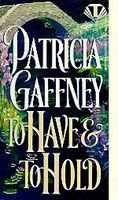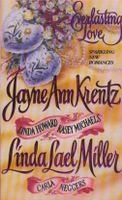To Have and To Hold, by Patricia Gaffney
>> Monday, October 31, 2005
 To Have and To Hold, by Patricia Gaffney is not one of my frequent rereads. In fact, even though I loved it when I first read it, I don't think I ever have read it again. It's just not a comfortable book, which is what I tend to look for in a reread.
To Have and To Hold, by Patricia Gaffney is not one of my frequent rereads. In fact, even though I loved it when I first read it, I don't think I ever have read it again. It's just not a comfortable book, which is what I tend to look for in a reread.
It probably would have stayed untouched on my shelves if it hadn't been for a truly fascinating discussion in one of the AAR message boards last year. That thread is long gone (it's been that long), but it left TH&TH hovering near the top of Mount TBR, ready for whenever I was in the mood for something heavy.
Sebastian Verlaine, the new Viscount D'Aubrey, was cynical, sophisticated, and too handsome for his own good. He was also bored. Why else would he agree to sit on the bench with two fellow magistrates to judge the petty crimes of his tenants and neighbors? It was all a lark--until a beautiful prisoner came before him, and he realized he held her fate in his hands.Well, it was just a difficult a read as I knew it was going to be. It was also an outstanding, beautiful one. An A+.
Rachel Wade knew everything about helplessness and sexual degradation. Her husband's violent death had freed her from that nightmare, but ten years in prison for his murder was only another kind of torture. Now a jaded viscount was offering her freedom--but at a price. "Housekeeper," he termed her new position at Lynton Hall. "Lord D'Aubrey's whore," the scandalized villagers called it.
A ruthless, unkind bargain. But neither of them guessed how the tables could be turned. How a game that began in base desire could lead to a breathtaking gamble in love.
Even knowing what was going to happen at every point and that everything was going to turn out well, I think I was just as shocked while reading the story as I was the very first time. The first half, especially, isn't at all pleasant to read. It's powerful, raw and incredibly good, definitely not something nice and sweet. Gaffney pulls no punches with her characters. She makes no excuses for them, simply gets inside their heads so much that you understand exactly why they're doing what they do, even when they don't know themselves.
Rachel's character was amazingly done. I loved how Gaffney shows her journey from someone pretty much dead inside, who just doesn't care, to someone completely alive. She starts out with only some tiny little sparks of life, and these grow very, very gradually.
Seeing this process, actually, is what saves that first part of the book from being too completely grim. You get the feeling that, in a way, Sebastian's actions are having some consequences on Rachel that are positive. Her shell at the beginning is so thick and resistent, that I got the feeling it would take something brutal to break it. And Sebastian provides it.
He's NOT trying to help her, I must stress that. This is what I meant when I wrote that Gaffney doesn't make excuses for her characters.. she doesn't have Sebastian going all "I need to behave this way because it's the only way to reach her", but in the end, his actions do have that effect. And through their effect on Rachel, they start having an effect on Sebastian himself, and providing him with the motivation to change.
One of the most amazing things about this book is how I was able to forgive Sebastian for his truly appalling behaviour, even after really hating him for a long part of the book. I have certain double standards when I read, and one of them is that I find it harder to forgive bad behaviour in men than in women, especially in historical settings. And arrogant, emotionally or physically abusive rapist jerks (like Sebastian, actually), piss me off the most.
So how come I was able to accept Sebastian as the hero and both believe in the happy ending here and root for him to have one? I don't want to repeat myself here, because I actually wrote a column at Romancing the Blog about just this, but basically, it's the oblivious jerks who can't tell right from wrong that I can't stand. Sebastian knows he's behaving very badly, which is why I buy his change of heart. If you read the column, you'll see I actually used Sebastian as an example, which, considering how long it had been since I'd read TH&TH, will give you some idea of just how memorable this book is!
I'm aware of the fact that this book isn't for everyone, but the rewards of getting through the difficult parts are great enough that I'd still recommend it to anyone who loves romance. Read more...











